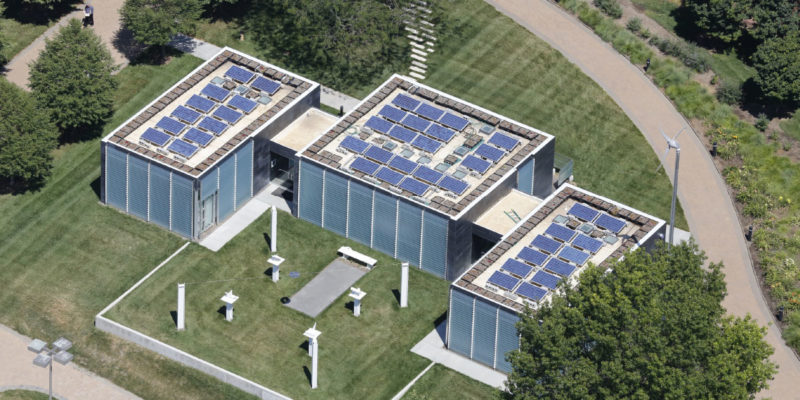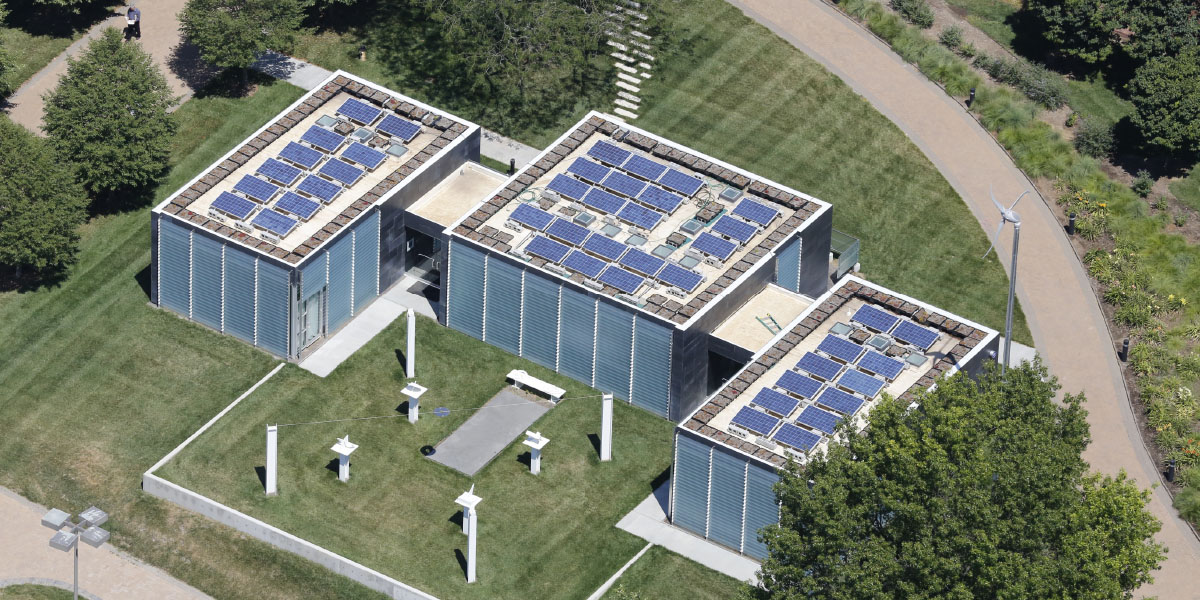A quick look around the campus is enough to reveal the commitment to sustainability made by Johnson County Community College (JCCC), Overland Park, Kan. You’ll notice single-stream recycling bins everywhere, with specialty containers—for electronics and plastic bags—located near high-traffic areas, such as the bookstore and library. While walking on permeable pavers, you’ll see an LEED building, native plantings, and numerous stations for charging electric vehicles or refilling water bottles. You can also admire art installations sculpted from a wide variety of recycled materials.
We’re in It Together
Even more happens behind the scenes, with the entire campus—from campus services to small committees—collaborating with JCCC’s Center for Sustainability. The college established the center in 2009, the same year that its students created the Sustainability Initiatives Fund. Administered by a student-run committee, the SIF is funded by student fees ($1 per credit hour) and covers the costs of many sustainability-related projects undertaken on campus. In recent years, for example, SIF has funded the installation of motion sensors in classrooms and LED fixtures in hallways, construction of bat boxes, reupholstering of chairs that would have otherwise gone into a landfill, and purchase of an electric truck.
“SIF dollars also fund the salaries of our student interns and two full-time and one part-time position, while funding for two other full-time staff positions comes from the general fund,” explains Jay Antle, a JCCC professor, who is also the founder and executive director of the Center for Sustainability. “Much of what the center does is work with students directly, and we also work one-on-one with faculty for curriculum enhancement. It all comes together in a cohesive package of the campus as a learning lab.”
For example, JCCC recently installed new building automation equipment that will enable students to access energy-usage data and track building performance and efficiency. Students in the electrical technology program have helped install photovoltaic panels on several campus buildings. Other classes participate in hands-on waste audits; their analyses of what the campus recycles or throws away help shape the center’s messages and initiatives.
Trash Becomes Cash
JCCC’s waste diversion rate currently stands at 51 percent, up markedly from 2010 when the Center for Sustainability began tracking metrics. In 2016, JCCC recycled 509 tons of materials, outpacing the 500 tons of trash it sent to landfills. As a result, trash hauling costs have gone down over the last seven years, by about 50 percent, while revenue from recycling aluminum, paper, plastics, glass, cardboard, wood, and electronics has gone up. All recycling revenue is returned to the student body through a scholarship fund; this year we are on track to contribute approximately $25,000 for scholarships.
Compost represents about 12 percent of the college’s total recyclables. Every weekday, our interns visit JCCC’s dining services department, catering service, and the hospitality and culinary program to pick up food waste. They transport the food waste to a large in-vessel composter; there, the food waste is mixed with woodchips from campus brush and trees, and with sawdust provided by a local cabinet company. (The carbon in the wood waste is used to chemically balance the nitrogen-based food scraps.) The entire mixture spends about 10 days in the composter, slowly turning, and is then aerated for about two months in a series of outdoor bins.
After another three to six months have passed, the mixture is ready for use at JCCC’s 2.5-acre farm, which is operated by students in the sustainable agriculture program. JCCC composts nearly 80,000 pounds of food waste annually, which not only diverts waste from landfills and disposals, but results in cost savings on organic fertilizer. Thanks to the nutrient-rich compost, our farm typically has 7 percent organic matter in its soil; most farms hope to have 4 percent.

Additional Efforts
While the center’s five staff members and eight interns design, promote, and lead JCCC’s sustainability initiatives, maintaining a robust culture of recycling and waste reduction depends on other staff members, students, and faculty. Their support and participation have made these additional initiatives a success:
- In 2012, we retired the inefficient system of having housekeeping personnel empty office trash cans nightly. Instead, employees discard their own trash and recycling in designated areas. Faculty and staff frequently comment that being responsible for trash removal has made them realize how much they throw away each day. They also understand that the time and energy the housekeeping staff is saving can be channeled into deeper cleaning of other areas.
- Furniture that employees no longer use or need goes into our surplus system; anyone else can claim an item for use on campus within 45 days. Remaining items are either auctioned online (with proceeds going to the general fund), donated to schools in underserved areas, or recycled.
- With our easy office clean-out program, employees who are retiring or having their space refreshed can fill a 60-gallon rolling container with anything they no longer want—and request additional containers if needed. Our interns sort through the materials, separating recyclables, items that can be donated to nonprofit thrift stores, and books that have possible resale value. Typically, we are able to divert 97 percent of the collected materials from the landfill.
- We gather surplus office supplies in a room known as ROSE (Reusable Office Supply Exchange), which is open several hours a day. Any employee can stop by to pick up binders, envelopes, pens, computer cables, and desk supplies that the college has already purchased.
- JCCC’s on-campus child-care facility maintains its own garden, giving children the opportunity to grow some of their food from seed. A chef from the culinary program regularly visits to show the children how to prepare and enjoy the garden’s produce.
- Through the e3 Sustainable Office Challenge, the center encourages offices and departments to identify ways to increase energy efficiency, reduce waste, improve purchasing procedures, and take better advantage of campus sustainability programs.
- We recently established a new farm-to-table internship. This student helps facilitate communication between JCCC’s farm and dining services, so the latter can plan menus around product availability, and make the deliveries to campus.
The center’s staff members regularly update Web-based dashboards, so the campus can monitor its energy usage and recycling efforts (view dashboards at https://sites.google.com/site/jcccsustainability). They also give tours to other organizations interested in waste reduction strategies and continually educate students and staff on sustainable practices.
Above all, says Antle, “We’re fulfilling the expectations of our students as to what an institution of higher education should be doing. We have both anecdotal comments and statistical findings showing that students who come to JCCC are very proud of their college for engaging in sustainability in so many ways.”
SUBMITTED BY Michael Rea, sustainability project manager, and Krystal Anton, recycling and waste minimization coordinator, Johnson County Community College, Overland Park, Kan.



